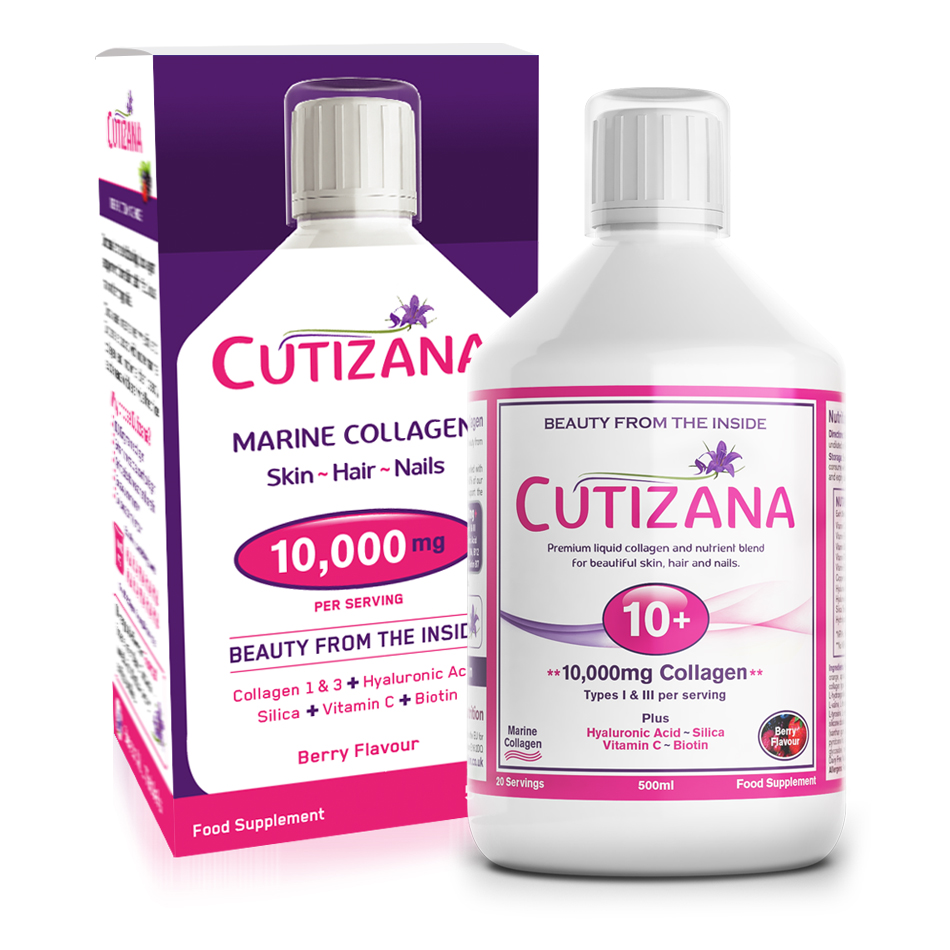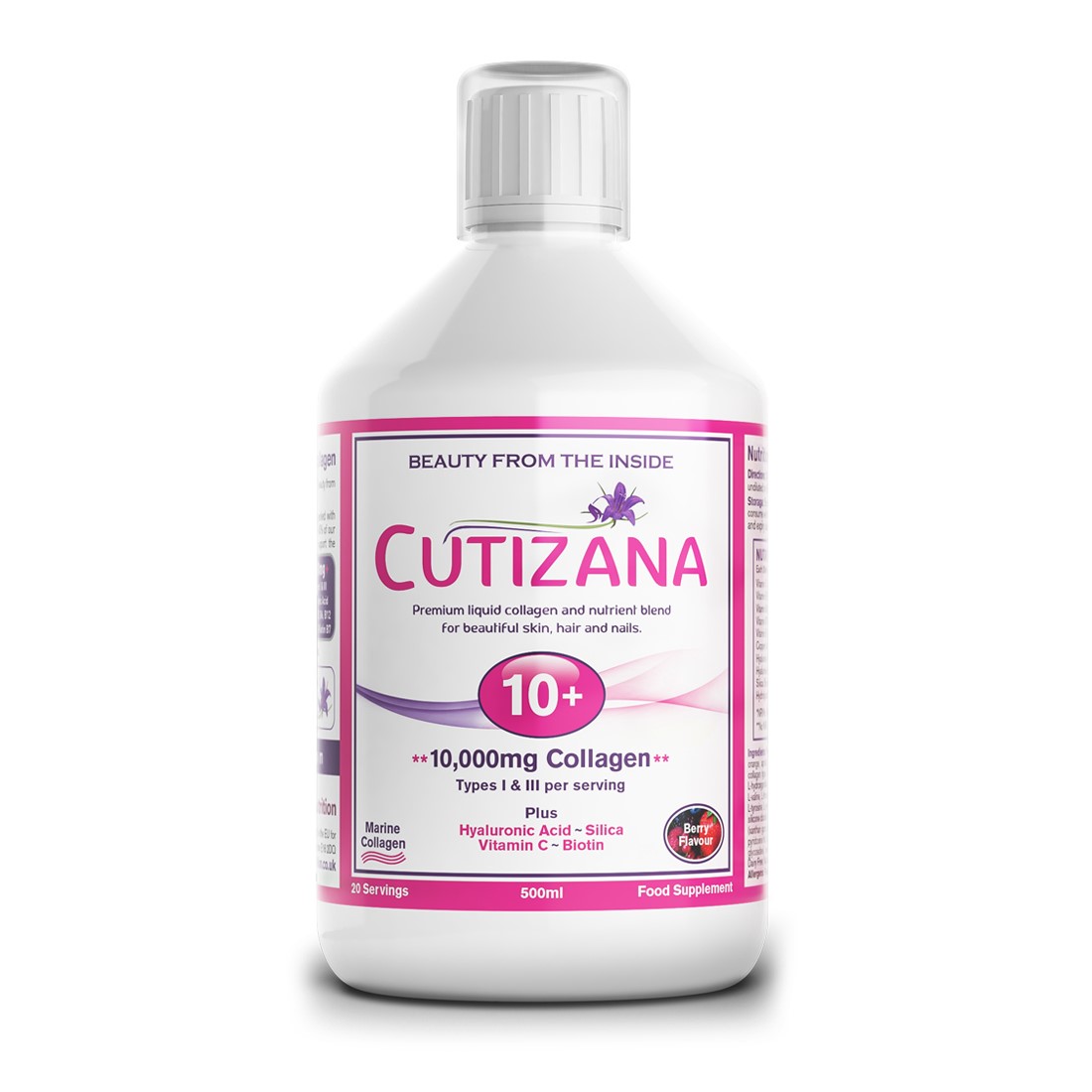Ingredients & Research
Cutizana is packed with nutrients which have scientific evidence to support their use.
Here are explanations of the function of key nutrients with 29 research papers referenced.
Hydrolysed Collagen 1 & 3
Cutizana is packed with 10,000mg of type 1 and 3 collagen. Collagen is one of the three crucial proteins that make your skin, hair, and nails, the other two are keratin and elastin.
The amino acids in collagen are glycine, proline, alanine, and hydroxyproline, whereas keratin is made of methionine, cysteine, and cystine. Elastin is made of glycine, proline, alanine, leucine, and valine. Cutizana contains all of these proteins.
These amino acids promote wound healing, protect the skin against UV rays, and strengthen hair follicles and nails.
Oral collagen supplements help improve the signs of ageing. They are known to improve skin elasticity, hydration, and skin plumpness. (1)
According to a 2021 study, oral intake of hydrolysed collagen for 3 months reduces wrinkles and promotes skin elasticity and hydration. (2)
In another study, women who used an oral supplement containing hydrolysed collagen, hyaluronic acid, and essential vitamins and minerals for 12 weeks achieved noticeable improvements in: (3)
- Facial wrinkles
- Skin elasticity
- Skin hydration
Similar benefits were observed in another study where the participants used an oral supplement containing collagen peptides, vitamin C, and natural extracts. (4)
Moreover, orally administered collagen peptides improve brittle nails and reduce the occurrence of broken nails. (5)
Lastly, hydrolysed collagen (with specific amino acids, vitamins, and minerals) significantly increases hair density. (6)
Hyaluronic Acid
Hyaluronic acid (HA or hyaluronan) is shown to promote wound healing in animals by increasing collagen. (7)
In one study involving women (45-60 years), oral hyaluronic supplementation resulted in: (8)
- Increased skin elasticity
- Higher skin hydration
- Lower skin roughness and wrinkle depths
In another study, the researchers revealed that oral administration of 200 mg of HA daily with other ingredients for 60 days led to: (9)
- Improved skin elasticity and hydration
- Decreased wrinkle depth
- Improved hair and nail appearance
B7 Biotin
Biotin (Vitamin B7 or H) helps your body regenerate hair, skin, and nail by promoting keratin formation.
Its deficiency can cause hair loss, brittle nails, and red rashes on the face. (10) Luckily, supplementation has been shown to improve brittle nails and uncombable hair. (11)
Vitamin C
Vitamin C (ascorbic acid) is a water-soluble vitamin with potent antioxidant properties.
- Your body uses vitamin C to make collagen, a crucial component of hair, skin, and nails.
- Vitamin C is also essential for elastin production. (12) Elastin helps your skin stretch and recoil.
- Keratin-producing cells—keratinocytes—need vitamin C to multiply. (13) Like collagen, keratin is a building block of your hair, skin, and nails.
Vitamin B5
Vitamin B5, or pantothenic acid, is a water-soluble vitamin. Your body uses B5 to make blood cells and produce energy from the food you eat.
- A 12-week oral administration of a pantothenic acid-based supplement reduced facial acne and blemishes. (14)
- Pantothenic acid is essential for keratinocyte division. (15)
- Panthenol, which converts into pantothenic acid, helps trap moisture in the nails, making them strong and flexible. (16)
- Vitamin B5 can promote collagen production by increasing the levels of micronutrients such as iron, copper, and manganese. (17)
- Panthenol stimulates hair growth by increasing blood flow, decreasing hair follicle death, and extending the growth phase in hair follicles. (18)
- Pantothenic acid can reverse greying of the fur in mice. However, such effects have not been replicated in humans. (19)
Vitamin B6
This water-soluble vitamin is essential for:
- Digesting protein, fat, and carbohydrates
- Making red blood cells
- Producing chemical messengers in the brain, neurotransmitters
Vitamin B6 deficiency can result in inflamed, scaly patches on the scalp and skin rashes. (10, 20)
Vitamin B12
Your body needs vitamin B12 to make collagen. (21) Its deficiency has been associated with premature greying, dark skin patches, and black-brown nails. (22, 23, 24)
Copper
Copper stimulates the division of keratin- and collagen-producing cells. (25) Its deficiency can lead to premature greying and pale skin. (26)
Silica
Silica (silicon dioxide; SiO2) contains the trace mineral silicon. Your body needs silicon to make collagen. (27) In addition, silicon promotes wound healing, decreases sebum (oily substance that protects the skin and hair) production, and strengthens hair and nails.
Another naturally abundant silicon compound is orthosilicic acid. Study shows that orthosilicic acid is essential for the development of skin, hair, and nails. (28)
In another study, the researchers noted that a 20-week administration of orthosilicic acid resulted in: (29)
- Reduced hair/nail brittleness
- Improved skin hydration
- Increased skin smoothness
References
1.Choi, Franchesca D. et al. “Oral Collagen Supplementation: A Systematic Review of Dermatological Applications.” Journal of drugs in dermatology: JDD vol. 18,1 (2019): 9-16.
2.de Miranda, Roseane B et al. “Effects of hydrolyzed collagen supplementation on skin aging: a systematic review and meta-analysis.” International journal of dermatology vol. 60,12 (2021): 1449-1461. doi:10.1111/ijd.15518
3.Borumand M, Sibilla S. Effects of a nutritional supplement containing collagen peptides on skin elasticity, hydration and wrinkles. J Med Nutr Nutraceut 2015;4:47-53
4.Addor, Flávia Alvim Sant’Anna et al. “Improvement of dermal parameters in aged skin after oral use of a nutrient supplement.” Clinical, cosmetic and investigational dermatology vol. 11 195-201. 30 Apr. 2018, doi:10.2147/CCID.S150269
5.Hexsel, Doris et al. “Oral supplementation with specific bioactive collagen peptides improves nail growth and reduces symptoms of brittle nails.” Journal of cosmetic dermatology vol. 16,4 (2017): 520-526. doi:10.1111/jocd.12393
6.Arias, Eva Maria et al. “Targeted Nutritional Supplementation for Telogen Effluvium: Multicenter Study on Efficacy of a Hydrolyzed Collagen, Vitamin-, and Mineral-Based Induction and Maintenance Treatment.” International journal of trichology vol. 14,2 (2022): 49-54. doi:10.4103/ijt.ijt_57_21
7.Damodarasamy, Mamatha et al. “Hyaluronan enhances wound repair and increases collagen III in aged dermal wounds.” Wound repair and regeneration : official publication of the Wound Healing Society [and] the European Tissue Repair Society vol. 22,4 (2014): 521-6. doi:10.1111/wrr.12192
8.Göllner, Imke et al. “Ingestion of an Oral Hyaluronan Solution Improves Skin Hydration, Wrinkle Reduction, Elasticity, and Skin Roughness: Results of a Clinical Study.” Journal of evidence-based complementary & alternative medicine vol. 22,4 (2017): 816-823. doi:10.1177/2156587217743640
9.Guaitolini, Ennio et al. “Randomized, Placebo-controlled Study of a Nutraceutical Based on Hyaluronic Acid, L-carnosine, and Methylsulfonylmethane in Facial Skin Aesthetics and Well-being.” The Journal of clinical and aesthetic dermatology vol. 12,4 (2019): 40-45.
10.DiBaise, Michelle, and Sherry M Tarleton. “Hair, Nails, and Skin: Differentiating Cutaneous Manifestations of Micronutrient Deficiency.” Nutrition in clinical practice : official publication of the American Society for Parenteral and Enteral Nutrition vol. 34,4 (2019): 490-503. doi:10.1002/ncp.10321
11.Patel, Deepa P et al. “A Review of the Use of Biotin for Hair Loss.” Skin appendage disorders vol. 3,3 (2017): 166-169. doi:10.1159/000462981
12.Hinek, Aleksander et al. “Sodium L-ascorbate enhances elastic fibers deposition by fibroblasts from normal and pathologic human skin.” Journal of dermatological science vol. 75,3 (2014): 173-82. doi:10.1016/j.jdermsci.2014.05.011
13.Wang, Kaiqin et al. “Role of Vitamin C in Skin Diseases.” Frontiers in physiology vol. 9 819. 4 Jul. 2018, doi:10.3389/fphys.2018.00819
14.Yang, Michael et al. “A randomized, double-blind, placebo-controlled study of a novel pantothenic Acid-based dietary supplement in subjects with mild to moderate facial acne.” Dermatology and therapy vol. 4,1 (2014): 93-101. doi:10.1007/s13555-014-0052-3
15.Kobayashi, Daisaku et al. “The effect of pantothenic acid deficiency on keratinocyte proliferation and the synthesis of keratinocyte growth factor and collagen in fibroblasts.” Journal of pharmacological sciences vol. 115,2 (2011): 230-4. doi:10.1254/jphs.10224sc
16.Hui, X et al. “In vitro human nail penetration and kinetics of panthenol.” International journal of cosmetic science vol. 29,4 (2007): 277-82. doi:10.1111/j.1467-2494.2007.00373.x
17.Vaxman, F et al. “Amélioration de la cicatrisation des anastomoses coliques par une supplémentation en vitamines B5 et C: Etude expérimentale chez le lapin” [Improvement in the healing of colonic anastomoses by vitamin B5 and C supplements. Experimental study in the rabbit]. Annales de chirurgie vol. 44,7 (1990): 512-20.
18.Shin, Jae Young et al. “Dexpanthenol Promotes Cell Growth by Preventing Cell Senescence and Apoptosis in Cultured Human Hair Follicle Cells.” Current issues in molecular biology vol. 43,3 1361-1373. 28 Sep. 2021, doi:10.3390/cimb43030097
19.Oregon State University. Linus Pauling Institute Micronutrient Information Center. Pantothenic Acid.
20.Ofoedu, Chigozie E et al. “Revisiting food-sourced vitamins for consumer diet and health needs: a perspective review, from vitamin classification, metabolic functions, absorption, utilization, to balancing nutritional requirements.” PeerJ vol. 9 e11940. 1 Sep. 2021, doi:10.7717/peerj.11940
21.Kesiktas, Nur et al. “Is There a Relationship between Vitamin B12 and Stress Urinary Incontinence?.” Lower urinary tract symptoms vol. 4,2 (2012): 55-8. doi:10.1111/j.1757-5672.2011.00116.x
22.Daulatabad, Deepashree et al. “Prospective Analytical Controlled Study Evaluating Serum Biotin, Vitamin B12, and Folic Acid in Patients with Premature Canities.” International journal of trichology vol. 9,1 (2017): 19-24. doi:10.4103/ijt.ijt_79_16
23.Brescoll, Jennifer, and Steven Daveluy. “A review of vitamin B12 in dermatology.” American journal of clinical dermatology vol. 16,1 (2015): 27-33. doi:10.1007/s40257-014-0107-3
24.Afra, T P et al. “Reversible Melanonychia Revealing Nutritional Vitamin-B12 Deficiency.” Indian dermatology online journal vol. 11,5 847-848. 19 Sep. 2020, doi:10.4103/idoj.IDOJ_13_20
25.Goluch-Koniuszy, Zuzanna Sabina. “Nutrition of women with hair loss problem during the period of menopause.” Przeglad menopauzalny = Menopause review vol. 15,1 (2016): 56-61. doi:10.5114/pm.2016.58776
26.Wong, Christine Y, and Derek H Chu. “Cutaneous signs of nutritional disorders.” International journal of women’s dermatology vol. 7,5Part A 647-652. 22 Sep. 2021, doi:10.1016/j.ijwd.2021.09.003
27.Araújo, Lidiane Advincula de et al. “Use of silicon for skin and hair care: an approach of chemical forms available and efficacy.” Anais brasileiros de dermatologia vol. 91,3 (2016): 331-5. doi:10.1590/abd1806-4841.20163986
28.Igarashi, M., Matsumoto, T., Yagihashi, F. et al. Non-aqueous selective synthesis of orthosilicic acid and its oligomers. Nat Commun 8, 140 (2017). https://doi.org/10.1038/s41467-017-00168-5
29.Barel, A et al. “Effect of oral intake of choline-stabilized orthosilicic acid on skin, nails and hair in women with photodamaged skin.” Archives of dermatological research vol. 297,4 (2005): 147-53. doi:10.1007/s00403-005-0584-6


















